WordPress developers are the architects behind dynamic and customizable websites. They leverage the power of the WordPress platform to create sites that are not only visually appealing but also functional and user-friendly.
Skills for a WordPress developer include proficiency in PHP, HTML, CSS, and JavaScript, as well as familiarity with WordPress themes and plugins. Additionally, they need to have strong problem-solving abilities and effective communication skills.
Candidates can write these abilities in their resumes, but you can’t verify them without on-the-job WordPress Developer skill tests.
In this post, we will explore 9 essential WordPress Developer skills, 11 secondary skills and how to assess them so you can make informed hiring decisions.
Table of contents
9 fundamental WordPress Developer skills and traits
The best skills for WordPress Developers include HTML & CSS, PHP, JavaScript, MySQL, Wordpress Themes, Wordpress Plugins, Responsive Design, SEO and Version Control.
Let’s dive into the details by examining the 9 essential skills of a WordPress Developer.
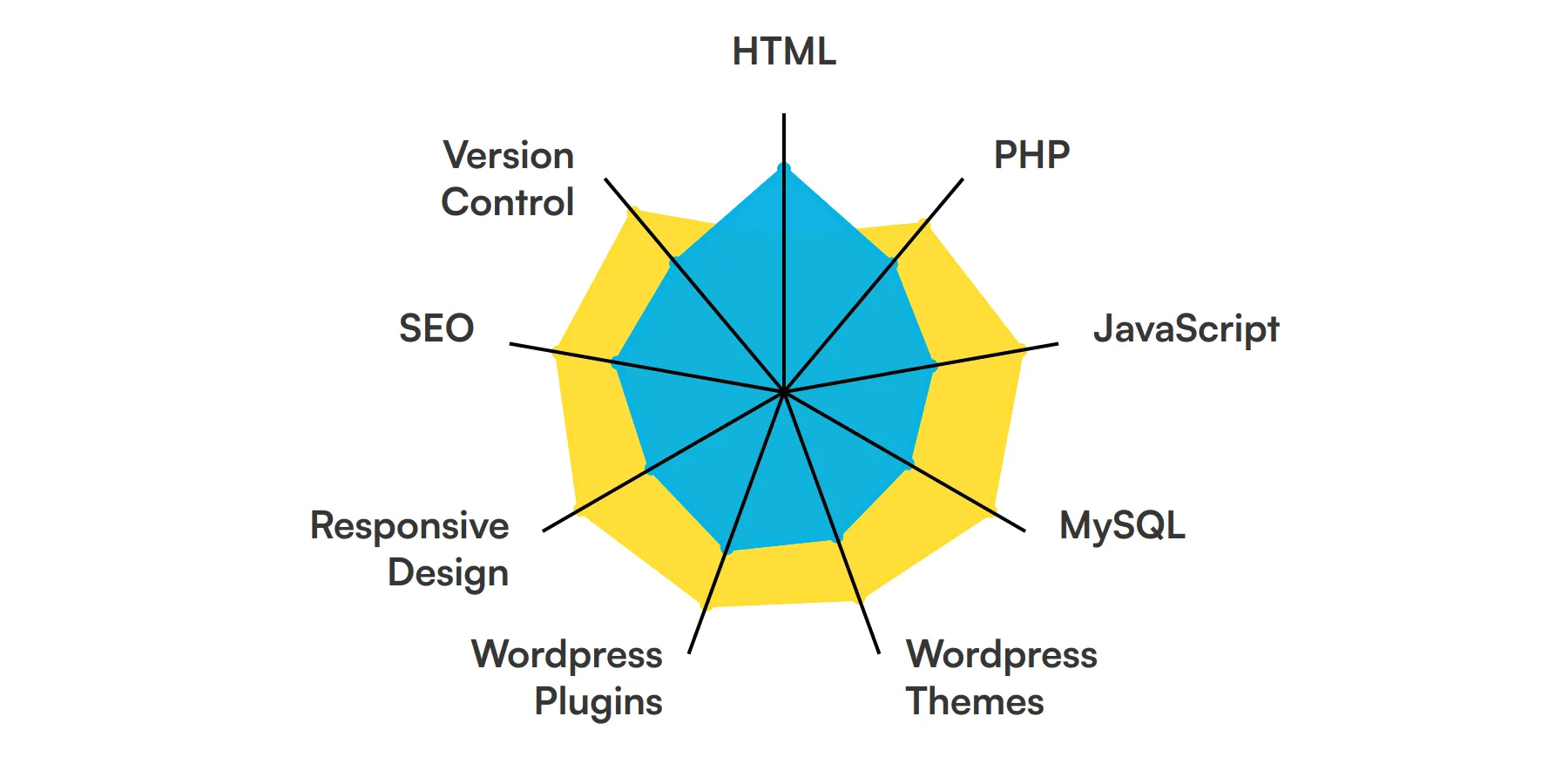
HTML & CSS
A Wordpress developer must have a solid understanding of HTML and CSS. These are the building blocks of web design, allowing you to structure content and style it to match the desired look and feel of the website.
For more insights, check out our guide to writing a HTML5 Developer Job Description.
PHP
Wordpress is built on PHP, so knowing this server-side scripting language is crucial. It allows you to create custom themes and plugins, and to modify the core functionalities of Wordpress to suit specific needs.
JavaScript
JavaScript is essential for adding interactive elements to a Wordpress site. Whether it's for creating dynamic content, handling events, or making asynchronous requests, JavaScript enhances the user experience significantly.
Check out our guide for a comprehensive list of interview questions.
MySQL
Wordpress uses MySQL for database management. A developer needs to know how to interact with the database to retrieve, insert, update, and delete data, ensuring the website runs smoothly and efficiently.
Wordpress Themes
Understanding how to create and customize Wordpress themes is a key skill. This involves knowing the Wordpress template hierarchy and how to use theme functions to build a unique and functional site.
For more insights, check out our guide to writing a WordPress Developer Job Description.
Wordpress Plugins
Plugins extend the functionality of Wordpress. A developer should know how to create custom plugins to add specific features or modify existing ones, ensuring the site meets all user requirements.
Responsive Design
With the variety of devices used to access websites, responsive design is a must. A Wordpress developer should be adept at creating sites that look and function well on desktops, tablets, and smartphones.
SEO
Search Engine Optimization (SEO) is crucial for driving traffic to a website. A Wordpress developer should understand SEO best practices to ensure the site is easily discoverable by search engines.
Check out our guide for a comprehensive list of interview questions.
Version Control
Using version control systems like Git is important for managing changes to the codebase. It allows a Wordpress developer to track changes, collaborate with others, and revert to previous versions if needed.
11 secondary WordPress Developer skills and traits
The best skills for WordPress Developers include REST API, Command Line, Web Performance, Security, Cross-Browser Compatibility, Debugging, Graphic Design, Content Management, Accessibility, E-commerce and Analytics.
Let’s dive into the details by examining the 11 secondary skills of a WordPress Developer.
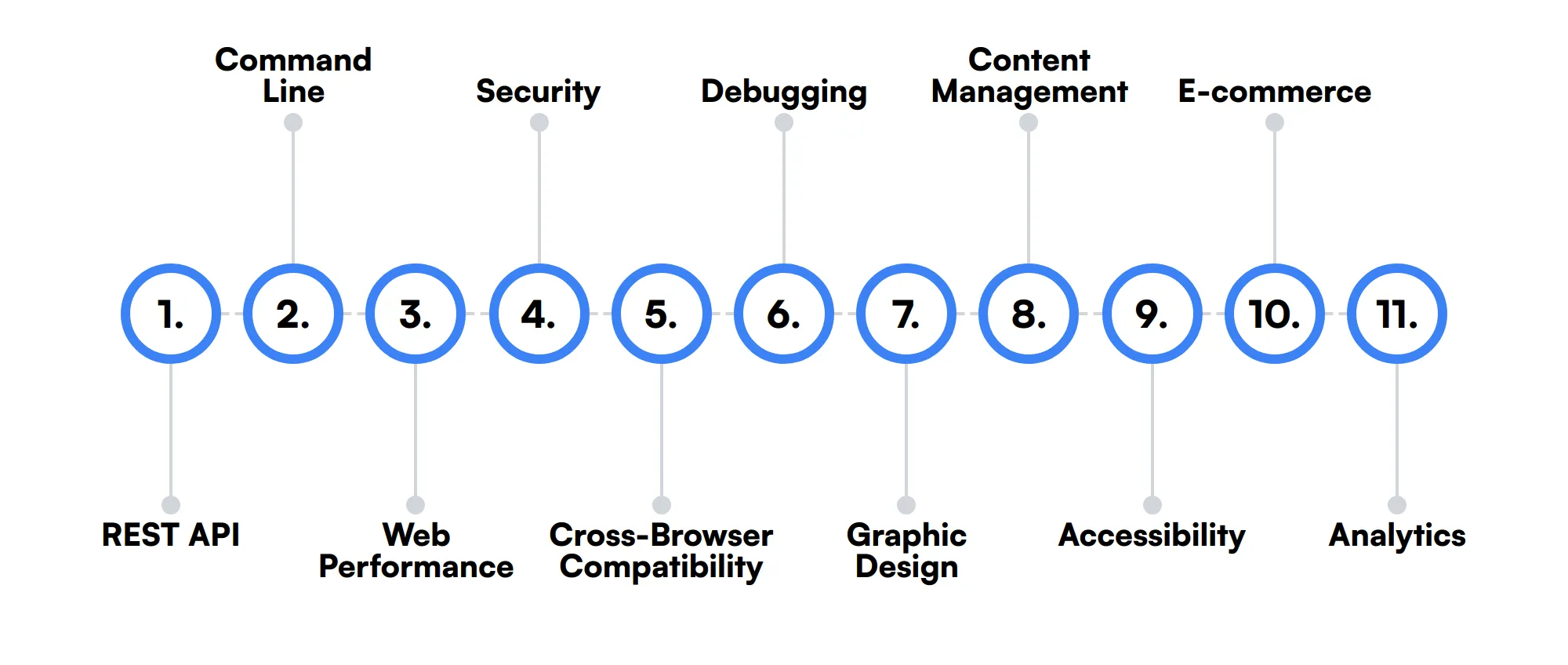
REST API
Knowing how to work with REST APIs can be beneficial for integrating third-party services and extending the functionality of a Wordpress site.
Command Line
Familiarity with the command line can speed up development tasks, such as managing files, running scripts, and using tools like WP-CLI for Wordpress management.
Web Performance
Understanding web performance optimization techniques ensures that the Wordpress site loads quickly and provides a good user experience.
Security
A Wordpress developer should be aware of common security vulnerabilities and how to protect against them, ensuring the site is secure from attacks.
Cross-Browser Compatibility
Ensuring that the website works well across different browsers is important for a consistent user experience. This involves testing and fixing any issues that arise.
Debugging
Being able to debug code effectively is crucial for identifying and fixing issues. This skill helps maintain the stability and functionality of the Wordpress site.
Graphic Design
Basic graphic design skills can be useful for creating custom graphics, editing images, and ensuring the visual elements of the site are appealing.
Content Management
Understanding how to manage and organize content within Wordpress is important for maintaining a well-structured and user-friendly site.
Accessibility
Ensuring the site is accessible to all users, including those with disabilities, is important. This involves following best practices and guidelines for web accessibility.
E-commerce
Knowledge of e-commerce platforms like WooCommerce can be beneficial for developers working on online stores, allowing them to implement and customize e-commerce functionalities.
Analytics
Understanding how to set up and interpret web analytics helps in tracking the performance of the site and making data-driven decisions for improvements.
How to assess WordPress Developer skills and traits
When it comes to hiring a WordPress developer, understanding the breadth of their skills is just as important as recognizing their ability to apply them effectively. From coding fundamentals like HTML, CSS, PHP, and JavaScript to specialized knowledge in WordPress themes, plugins, and responsive design, each skill plays a significant role in their overall capability.
Assessing the depth and practical application of these skills can transform the hiring process. Tools like Adaface assessments streamline this evaluation, ensuring you not only identify candidates with the right skills but also those who can leverage them in real-world scenarios.
Using Adaface, you can create customized assessments that focus on the specific skills listed, such as MySQL, SEO, and version control, which are integral to a WordPress developer's role. This approach not only helps in pinpointing the right talent but also significantly cuts down on screening time. Learn more about Adaface assessments here.
Let’s look at how to assess WordPress Developer skills with these 6 talent assessments.
HTML/ CSS Online Test
Our HTML/ CSS Online Test evaluates a candidate's ability to design and style web pages using HTML and CSS. The test covers a wide range of topics from basic HTML tags to advanced CSS animations and responsive design.
The test assesses candidates on their understanding of HTML forms, CSS box model, Flexbox, Grids, and media queries. It also evaluates their skills in integrating custom fonts and handling images within web layouts.
Candidates who perform well demonstrate a strong grasp of CSS styling techniques, the ability to create modern, responsive layouts, and proficiency in enhancing user interfaces with CSS animations.
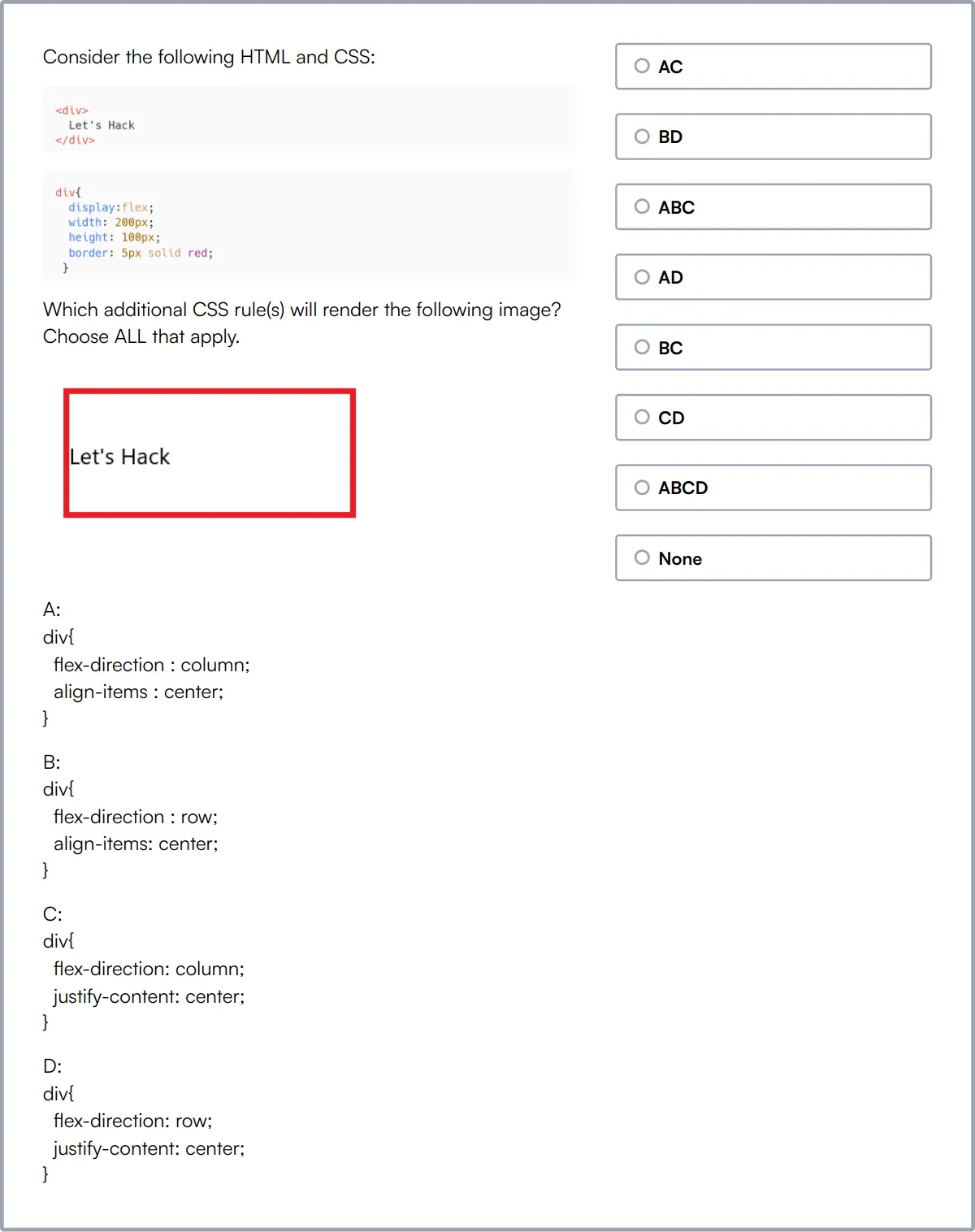
PHP Online Test
Our PHP Online Test measures a candidate's expertise in PHP programming, covering both fundamental and advanced aspects such as OOPs, error handling, and database interactions.
This test evaluates the candidate's ability to write PHP code for custom functions, manage sessions, and handle errors and exceptions effectively. It also tests their knowledge in using PHP for server-side caching and database operations.
Successful candidates will demonstrate a deep understanding of PHP coding standards, the ability to optimize backend functionality, and skills in creating secure, scalable server-side scripts.
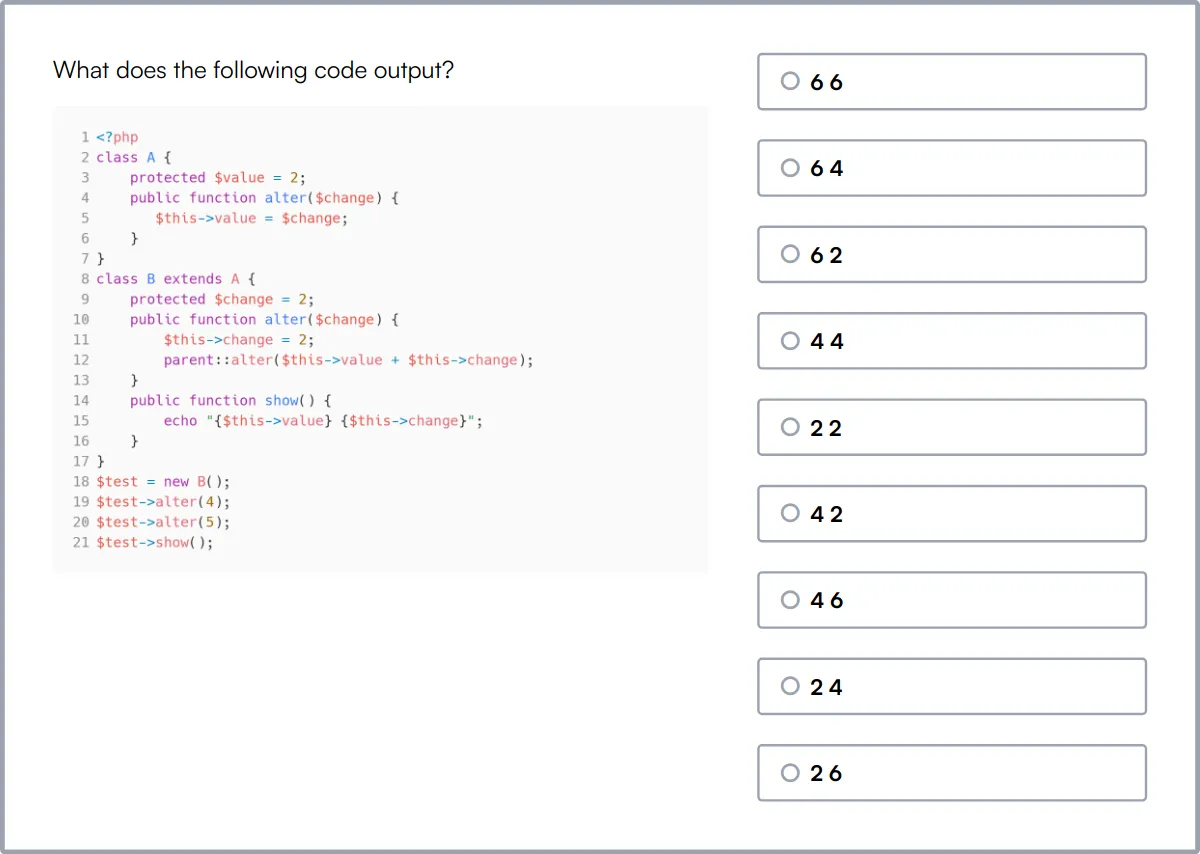
JavaScript Online Test
Our JavaScript Online Test focuses on assessing a candidate's JavaScript skills from basic programming to advanced concepts like asynchronous programming and API handling.
The test challenges candidates with scenarios involving ES6 features, error handling, and DOM manipulation. It also evaluates their understanding of higher-order functions, closures, and OOP concepts in JavaScript.
High-scoring candidates will exhibit proficiency in writing clean and efficient JavaScript code, leveraging modern JS features, and implementing complex front-end logic.
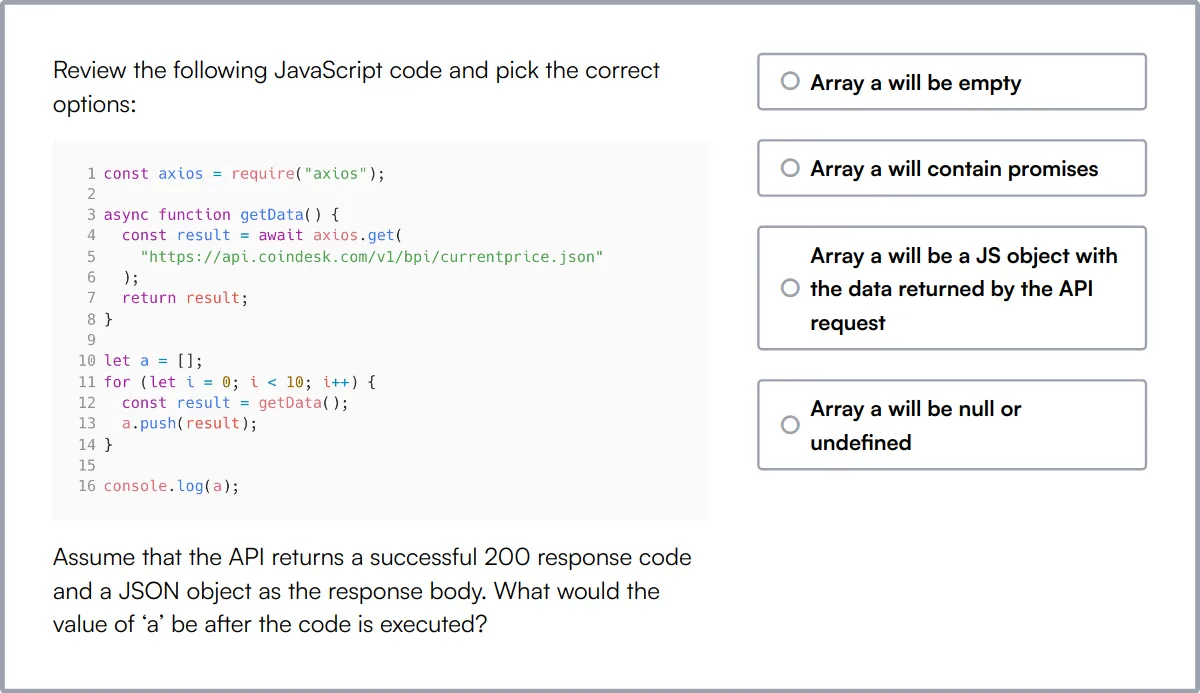
MySQL Online Test
Our MySQL Online Test assesses candidates on their ability to design, query, and manage databases using MySQL. It includes topics like SQL queries, normalization, indexing, and transactions.
Candidates are tested on their knowledge of database design principles, efficient query writing, and the use of advanced MySQL features such as views, stored procedures, and triggers.
Candidates who excel in this test demonstrate strong database management skills, the ability to optimize database performance, and proficiency in maintaining data integrity and security.

PHP & WordPress Developer Online Test
Our PHP & WordPress Developer Online Test evaluates the ability to develop and customize WordPress sites, incorporating both front-end and back-end development skills.
The test assesses candidates on WordPress installation, theme customization, plugin development, and core updates. It also evaluates their skills in optimizing WordPress sites for SEO and managing database interactions.
Successful candidates will show comprehensive knowledge of WordPress architecture, the ability to extend its functionality with custom plugins, and skills in enhancing site performance and security.
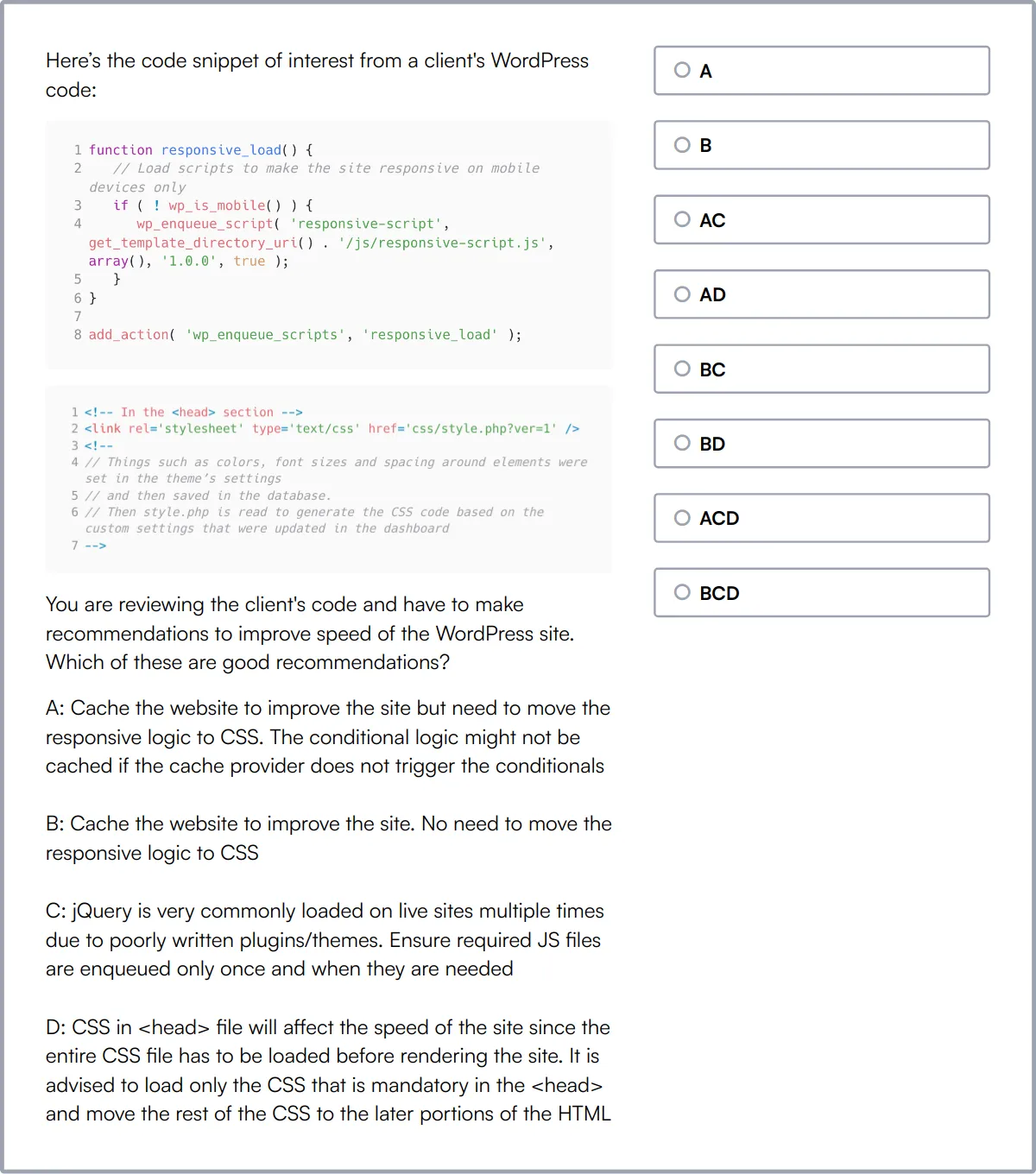
Front End Developer Online Test
Our Front End Developer Online Test gauges a candidate's proficiency in front-end web development, focusing on HTML, CSS, JavaScript, and responsive design.
This test evaluates the candidate's skills in UI/UX design, using Git for version control, and debugging front-end issues. It also assesses their ability to optimize web performance and ensure cross-browser compatibility.
Candidates who perform well in this test are adept at creating engaging user interfaces, writing efficient code, and optimizing web applications for maximum speed and scalability.
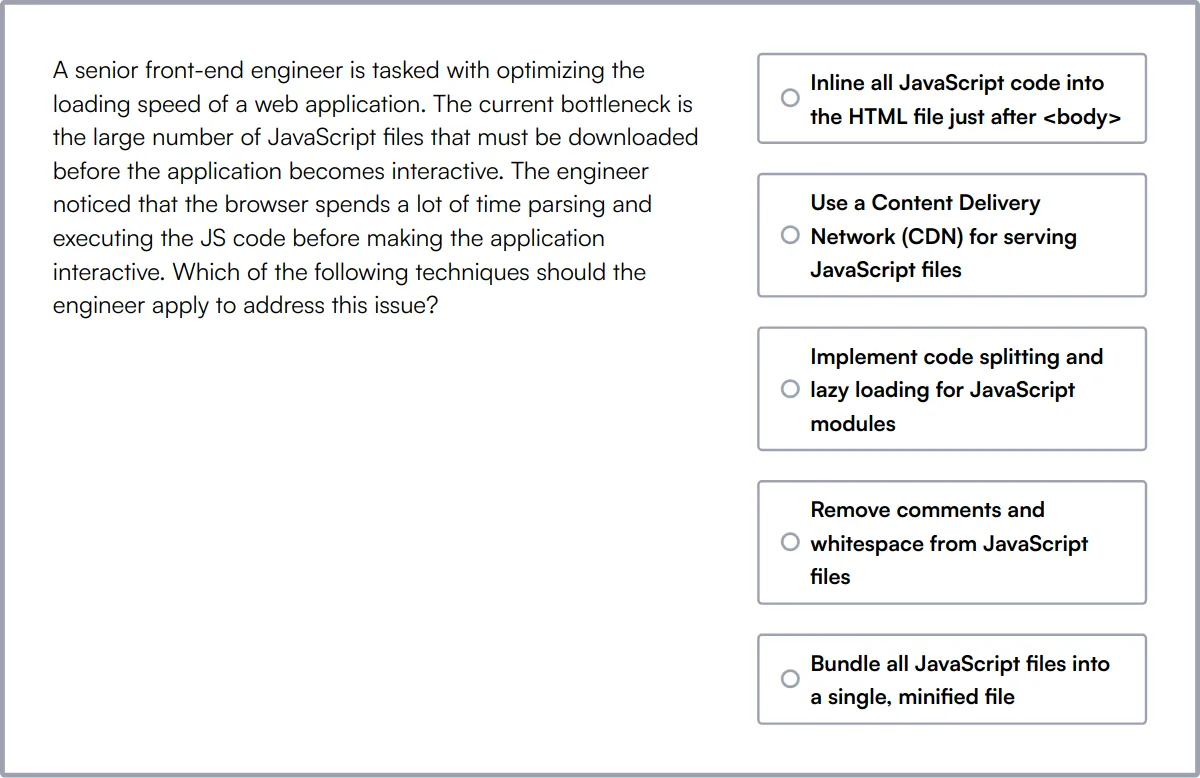
Summary: The 9 key WordPress Developer skills and how to test for them
| WordPress Developer skill | How to assess them |
|---|---|
| 1. HTML & CSS | Gauge how a developer creates a well-structured, user-friendly interface |
| 2. PHP | Evaluate the ability to build and maintain dynamic server-side applications |
| 3. JavaScript | Assess a developer’s skills in creating interactive, dynamic designs |
| 4. MySQL | Check proficiency in managing and querying relational databases |
| 5. Wordpress Themes | |
| 6. Wordpress Plugins | |
| 7. Responsive Design | Determine a candidate’s skills in building customizable, flexible designs across devices |
| 8. SEO | Evaluate knowledge in optimizing websites for search engines |
| 9. Version Control | Assess the ability to manage code changes using version control systems |
PHP & WordPress Developer Online Test
WordPress Developer skills FAQs
What technical skills should a WordPress developer have?
A WordPress developer should be proficient in HTML & CSS, PHP, JavaScript, and MySQL. Knowledge of WordPress themes and plugins is also necessary. Additionally, skills in REST API, command line usage, and version control systems like Git are important.
How can I assess a candidate's ability in responsive design and cross-browser compatibility?
To assess these skills, review the candidate's portfolio for websites that display well on various devices and browsers. You can also conduct practical tests where the candidate must adjust a webpage’s layout to function across different screen sizes and browsers.
What are the best practices for evaluating WordPress plugin development skills?
Evaluate plugin development skills by asking candidates to describe plugins they have developed or contributed to. Request code samples or case studies that demonstrate their ability to extend WordPress functionality effectively through custom plugins.
Why is understanding web performance optimization important for a WordPress developer?
Web performance optimization is key to improving site speed and user experience. A WordPress developer should know how to implement caching, optimize images, and minimize CSS and JavaScript to enhance website performance.
How important is SEO knowledge for a WordPress developer?
SEO knowledge is important as it helps ensure that websites rank well in search engines. A WordPress developer should understand SEO best practices, such as using appropriate keywords, optimizing tags, and ensuring mobile-friendliness.
What security practices should a WordPress developer be familiar with?
A WordPress developer should know how to secure websites by implementing features like SSL, data sanitization, and secure user authentication. Familiarity with common security plugins and regular updates to WordPress core and plugins are also essential.
How can I test a developer's skills in debugging and troubleshooting WordPress issues?
Conduct a technical interview that includes problem-solving scenarios related to WordPress. You can also provide a buggy piece of code or plugin and ask the candidate to identify and fix the issues.
What role does content management play in a WordPress developer's job?
Content management is central to using WordPress effectively. Developers should be adept at using the WordPress editor, organizing content, and understanding user roles and permissions to manage a site’s content efficiently.

40 min skill tests.
No trick questions.
Accurate shortlisting.
We make it easy for you to find the best candidates in your pipeline with a 40 min skills test.
Try for freeRelated posts
Free resources



